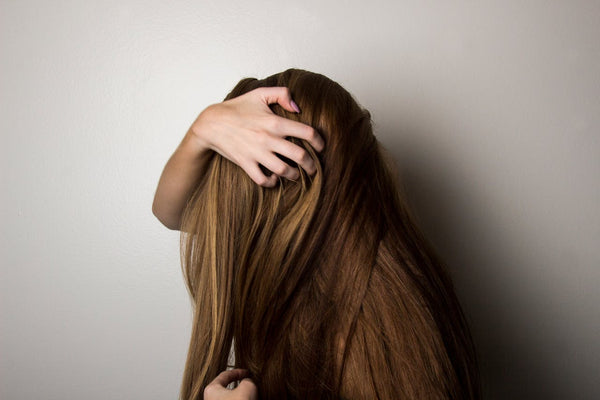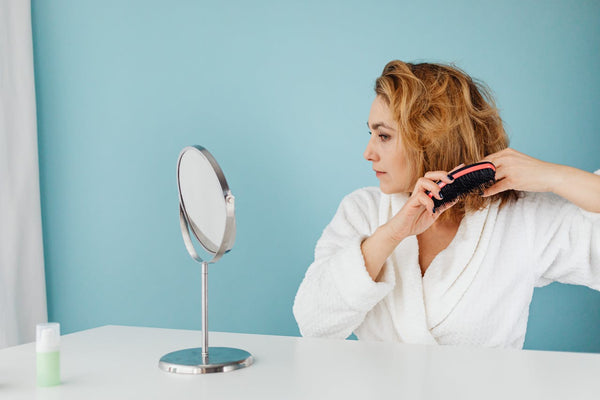Pregnancy Hair Care: What You Should Do and Shouldn’t Do

During pregnancy, elevated estrogen levels extend your hair’s growth phase, often making it appear fuller and shinier. However, post-pregnancy hormone fluctuations can trigger temporary shedding. Proper care during and after pregnancy helps maintain hair strength and minimize damage.
Common Hair Concerns During Pregnancy
1. Hair Fall and Shedding
While most women experience less hair fall during pregnancy, shedding can occur post-partum. Stress, hormonal changes, and nutritional gaps often contribute to this temporary condition.
2. Dryness and Frizz
Hormonal imbalance and dehydration can make hair appear frizzy, dull, or dry—especially at the ends.
3. Scalp Sensitivity
Pregnancy can make your scalp more sensitive to harsh chemicals or strong fragrances, which may lead to irritation or itching.
4. Excess Oiliness
Some women notice increased sebum production, causing greasy roots or scalp build-up.
Pregnancy Hair Care Do’s
1. Use Pregnancy-Safe Hair Products
Opt for gentle, clinically formulated shampoos, lightweight leave-in conditioners, and non-toxic hair serums that are free from sulfates, parabens, silicones, and artificial fragrances. These help cleanse and protect your hair without exposing you or your baby to harmful chemicals.
2. Keep Your Scalp Clean
A clean scalp promotes healthy growth. Use a mild, moisturizing shampoo 2–3 times a week to remove build-up and impurities while maintaining natural moisture balance.
3. Nourish with Leave-In Conditioner
Hydrating leave-in conditioners help seal moisture and reduce breakage, especially for dry or textured hair. Choose lightweight, plant-based formulas enriched with keratin or natural proteins.
4. Use a Protective Serum
Apply a few drops of a pregnancy-safe serum after washing to smooth frizz, strengthen strands, and protect from pollution and UV exposure. Serums rich in amino acids and natural oils can also help restore elasticity.
5. Eat a Balanced Diet
Include foods rich in iron, protein, biotin, and omega-3 fatty acids. Nutrients like zinc and vitamin E promote hair strength and shine.
6. Stay Hydrated
Adequate hydration supports both scalp and hair health. Aim for at least 8–10 glasses of water daily.
Pregnancy Hair Care Don’ts
1. Avoid Harsh Chemicals
Steer clear of shampoos and treatments containing sulfates, parabens, formaldehyde, ammonia, or synthetic fragrances. These can irritate your scalp and are best avoided during pregnancy.
2. Limit Heat Styling
Excessive blow-drying, straightening, or curling can strip moisture and damage fragile hair. If needed, use tools at low heat and always apply a heat protectant.
3. Skip Chemical Treatments
Avoid hair coloring, rebonding, keratin, or smoothing treatments during pregnancy and while breastfeeding. Opt for natural conditioning masks instead.
4. Don’t Ignore Scalp Changes
If you experience itchiness, flakes, or excessive oiliness, switch to a balancing shampoo. Gentle scalp exfoliation once a week can also help maintain a healthy scalp.
5. Avoid Tight Hairstyles
Loose styles prevent breakage and reduce stress on hair roots, especially during shedding phases.
Safe and Effective Hair Care Routine During Pregnancy
| Step | Product Type | Frequency | Benefit |
|---|---|---|---|
| 1 | Mild, sulfate-free shampoo | 2–3 times/week | Cleanses gently and maintains moisture |
| 2 | Hydrating leave-in conditioner | After every wash | Smoothens and strengthens |
| 3 | Lightweight serum | Daily or post-wash | Adds shine, protects, reduces frizz |
Nourishment Beyond Products
-
Regular scalp massage with mild oils improves circulation and reduces stress.
-
Sleep and stress management are equally important for maintaining hair growth.
-
Postpartum care: continue your gentle routine after delivery to help manage natural hair fall.
Final Thoughts
Pregnancy hair care is about embracing gentleness and safety while nurturing your hair from within. Using clean, pregnancy-safe hair products - like sulfate-free shampoos, hydrating leave-in conditioners, and strengthening serums - can help maintain shine, strength, and smoothness throughout this special time. With consistent care, your hair can remain healthy and radiant before, during, and after pregnancy.
FAQ
1. Are sulfate-free shampoos better during pregnancy?
Yes. Sulfate-free shampoos cleanse gently without stripping natural oils or irritating your scalp - ideal for pregnancy.
2. Can I use hair serums while pregnant?
Absolutely. Choose lightweight, silicone-free serums with natural actives to tame frizz and enhance shine safely.
3. Is hair coloring safe during pregnancy?
It’s best avoided. Most dyes contain ammonia and other chemicals that may be harsh for sensitive scalps during pregnancy.
4. Why does my hair become dry or oily during pregnancy?
Hormonal fluctuations can increase or decrease oil production, causing dryness or excess oiliness. Using balanced, mild products can help manage this.
5. How can I reduce postpartum hair fall?
Continue using nourishing products, eat a protein-rich diet, and maintain scalp health. The shedding phase is temporary and usually resolves in a few months.



